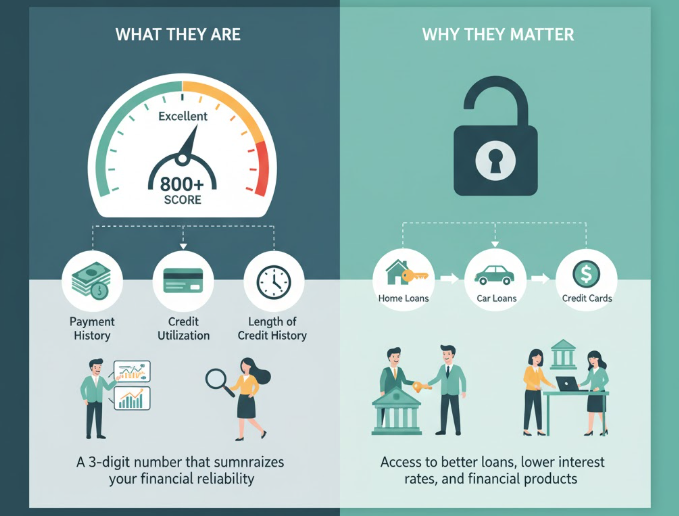Introduction: Your Financial Reputation in Numbers
Imagine walking into a store, seeing a laptop you really want, and the seller says, “You can take it now and pay later—if your credit score allows it.”
That’s how powerful this simple number is.
A credit score is like a financial report card — it shows how trustworthy you are with money. Whether you’re applying for a car loan, getting a mortgage, or even renting an apartment, your score can open (or close) doors.
But what is this mysterious number, how is it calculated, and why does it affect so many areas of life? Let’s break it down in simple, practical terms.
What Exactly Is a Credit Score?
A credit score is a three-digit number, usually ranging from 300 to 850, that represents your creditworthiness — in other words, how likely you are to repay borrowed money on time.
Lenders, such as banks and credit card companies, use this number to decide:
-
Whether to lend you money
-
How much interest to charge
-
How much credit to offer
In short, your credit score tells lenders how risky or reliable you are as a borrower.
Credit Score Range Chart
| Score Range | Category | Meaning |
|---|---|---|
| 300 – 579 | Poor Credit | High risk; loan approvals unlikely |
| 580 – 669 | Fair Credit | Some lenders may approve with higher rates |
| 670 – 739 | Good Credit | Considered responsible borrower |
| 740 – 799 | Very Good Credit | Lower risk; better loan terms |
| 800 – 850 | Excellent Credit | Top-tier borrower; best interest rates |
The higher your credit score, the better your chances of getting approved for loans with low interest rates and flexible repayment options.
Why Credit Scores Matter So Much
Your credit score impacts far more than just loans. It’s a reflection of your financial habits — how well you manage debt, pay bills, and handle credit.
Here are the major areas where your credit score plays a key role:
1. Loan Approvals
Banks and financial institutions look at your score to determine whether they can trust you with their money.
-
A low score may lead to loan rejection or higher interest rates.
-
A high score increases your chances of approval and helps you secure better deals.
2. Credit Card Applications
If you’re applying for a new credit card, your score determines:
-
Whether you’ll be approved
-
Your credit limit
-
Your interest rate (APR)
3. Renting a Home or Apartment
Landlords often check your credit score to see if you’re reliable at paying rent.
A strong credit score can make it easier to get approved for a rental — sometimes even without a co-signer.
4. Buying a Car
When financing a vehicle, car dealerships and lenders rely on your score to set your interest rate.
A higher score means lower monthly payments over time.
5. Getting a Job
Some employers, especially in the finance industry, review credit reports to see if candidates are financially responsible.
While they don’t see your actual score, poor credit history can still raise red flags.
6. Utility and Phone Services
Telecom and utility companies may check your credit score before giving you postpaid plans.
If your score is low, you might have to pay a security deposit upfront.
How Is Your Credit Score Calculated?
Credit scoring systems—like FICO and VantageScore—use several factors to calculate your score.
Each factor has a different level of importance, as shown below.
FICO Score Breakdown
| Factor | Weight (%) | Description |
|---|---|---|
| Payment History | 35% | How consistently you pay bills on time |
| Amounts Owed | 30% | How much credit you’re using vs. your limit |
| Length of Credit History | 15% | How long you’ve had credit accounts |
| New Credit Inquiries | 10% | How often you apply for new credit |
| Credit Mix | 10% | Variety of credit types (loans, cards, etc.) |
1. Payment History (35%)
This is the single most important factor.
If you’ve ever missed a payment or made one late, it could lower your score significantly.
Tip: Always pay bills on time, even if it’s just the minimum due.
2. Amounts Owed (30%)
This looks at your credit utilization ratio, which is the amount of credit you’re using compared to your total credit limit.
Keeping your utilization below 30% is ideal.
For example, if your card has a $1,000 limit, try not to owe more than $300.
3. Length of Credit History (15%)
The longer your accounts have been open and active, the better.
Lenders like stability — it shows you have a proven track record.
4. New Credit (10%)
Applying for too many new credit cards or loans within a short period can lower your score.
Every time you apply, a “hard inquiry” appears on your credit report.
5. Credit Mix (10%)
Having a variety of credit types — like credit cards, personal loans, and a car loan — shows you can manage different kinds of debt responsibly.
The Three Major Credit Bureaus
In most countries, including the U.S., credit scores are maintained by credit bureaus — independent agencies that collect and analyze your financial data.
The three main credit bureaus are:
-
Equifax
-
Experian
-
TransUnion
Each bureau may have slightly different information, so your score can vary depending on which report lenders check.
Credit Score vs. Credit Report
People often confuse these two, but they’re different.
| Credit Score | Credit Report |
|---|---|
| A 3-digit number that summarizes your credit health | A detailed record of your borrowing and repayment history |
| Used to quickly assess your risk level | Used for deeper analysis by lenders |
| Changes frequently | Updated monthly or quarterly |
In simple terms, your credit report is the book, and your credit score is the summary on the cover.
Common Myths About Credit Scores
Let’s clear up a few common misconceptions that often confuse people:
Myth 1: Checking Your Score Hurts It
✅ Truth: Checking your own score is a soft inquiry and has no impact on your score. Only “hard inquiries” from lenders affect it.
Myth 2: You Need Debt to Build Credit
✅ Truth: You don’t need to carry debt to build credit. Using a credit card and paying it off in full every month is enough.
Myth 3: Income Affects Your Credit Score
✅ Truth: Your salary doesn’t directly impact your score. However, your ability to manage credit responsibly does.
Myth 4: Closing Old Accounts Improves Your Score
❌ Truth: Closing old accounts can lower your score by shortening your credit history.
Myth 5: A Single Missed Payment Doesn’t Matter
❌ Truth: Even one missed payment can reduce your score significantly, especially if it’s over 30 days late.
How to Improve Your Credit Score (Step-by-Step)
Building a good credit score takes time and discipline. Here’s a simple plan anyone can follow:
Step 1: Pay Bills on Time
Even one late payment can damage your score.
-
Set reminders or enable auto-pay to stay consistent.
Step 2: Keep Credit Utilization Low
Aim to use less than 30% of your total credit limit.
If your limit is $2,000, try not to exceed $600.
Step 3: Don’t Apply for Too Many New Accounts
Multiple applications can make you look desperate for credit, which lowers your score.
Step 4: Keep Old Accounts Open
Older accounts help improve your average credit age, which boosts your score.
Step 5: Mix It Up
Having different credit types (like credit cards and installment loans) shows you can handle credit responsibly.
Step 6: Regularly Check Your Credit Report
You’re entitled to one free annual report from each major bureau (in the U.S.).
Review them for errors, such as:
-
Payments wrongly marked late
-
Accounts you don’t recognize
-
Incorrect balances
Dispute any errors you find — they can unfairly drag down your score.

Visual Guide: How Your Actions Affect Your Score
| Action | Impact on Score | Speed of Impact |
|---|---|---|
| Paying bills on time | Positive | Fast |
| Missing payments | Negative | Immediate |
| Using over 30% of credit | Negative | Gradual |
| Keeping old accounts open | Positive | Slow, long-term |
| Applying for multiple new cards | Negative | Moderate |
| Paying off debt | Strongly Positive | Fast |
(Tip: Think of your credit score like a garden — consistent care helps it grow, but one mistake can wilt it quickly.)
The Long-Term Benefits of a Good Credit Score
Having a strong credit score is like having a VIP pass in the financial world.
Here’s how it helps in the long run:
1. Lower Interest Rates
You’ll pay less money in interest over time on loans and credit cards.
2. Easier Loan Approvals
Banks and lenders are more confident in approving your applications.
3. Higher Credit Limits
With a solid score, lenders trust you with more spending power.
4. Better Housing Options
A good score gives you an edge in competitive rental markets.
5. Security Deposits May Be Waived
Some utilities or mobile providers skip the deposit requirement for people with good credit.
6. Peace of Mind
Good credit means fewer financial roadblocks and more opportunities.
How Long Negative Information Stays on Your Report
| Type of Negative Record | Time on Credit Report |
|---|---|
| Late payments | 7 years |
| Debt collections | 7 years |
| Bankruptcies | 7–10 years |
| Hard inquiries | 2 years |
Even though negative marks fade over time, consistent positive behavior can speed up recovery.
Smart Credit Habits for Teenagers and Beginners
If you’re just starting out, here are safe ways to begin building credit:
-
Apply for a secured credit card (you deposit money as collateral).
-
Become an authorized user on a parent’s or sibling’s credit card.
-
Use your card for small purchases and pay in full every month.
-
Track your spending using budgeting apps to avoid debt.
-
Avoid payday loans or cash advances — they can trap you in high-interest cycles.
Building credit early gives you a head start in adult life.
Quick Credit Score FAQs
Q1: What’s the average credit score?
👉 In most countries, an average FICO score is around 710 — considered “Good.”
Q2: How fast can I improve my score?
👉 Usually within 3 to 6 months of consistent positive actions.
Q3: Do student loans affect my credit score?
👉 Yes. Paying them on time builds credit; missing payments can lower it.
Q4: Can I have more than one credit score?
👉 Yes, because each bureau may use different data and scoring models.
Q5: Does closing a credit card hurt my score?
👉 It can, especially if it was an older account or had a high credit limit.
Infographic: The Path to a Strong Credit Score
(Visual Concept Idea – can be created later)
Steps:
-
Open an account →
-
Pay on time →
-
Keep utilization below 30% →
-
Avoid too many inquiries →
-
Review credit report →
-
Enjoy financial freedom
Conclusion: Take Control of Your Financial Future
Your credit score isn’t just a number—it’s a reflection of your habits, discipline, and financial responsibility.
It affects your ability to borrow, rent, or even land a job.
The good news?
You have full control over it. Every on-time payment, every debt paid off, and every wise spending decision pushes your score upward.
Start small — pay bills on time, use credit wisely, and check your reports regularly. Over time, these small actions build a strong financial foundation that can open doors to lower interest rates, better opportunities, and lasting financial peace.
Remember:
💡 Your credit score is your silent financial partner—nurture it, and it will reward you for life.

